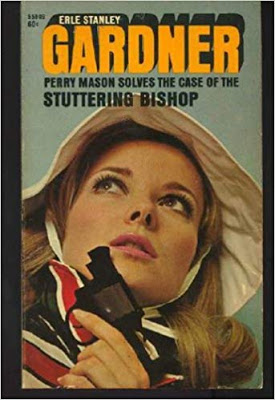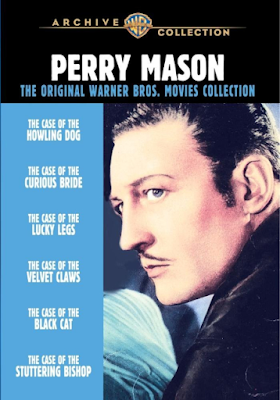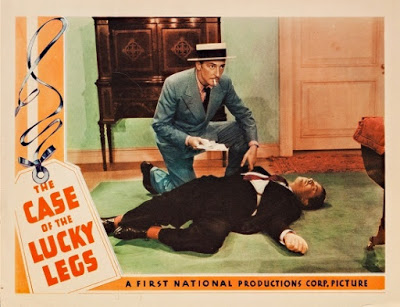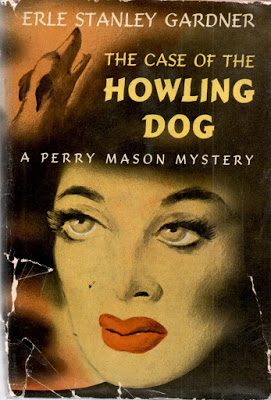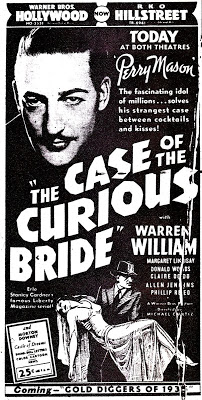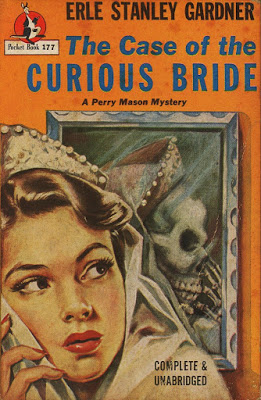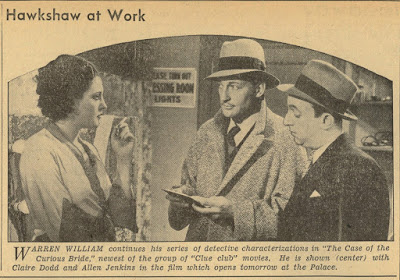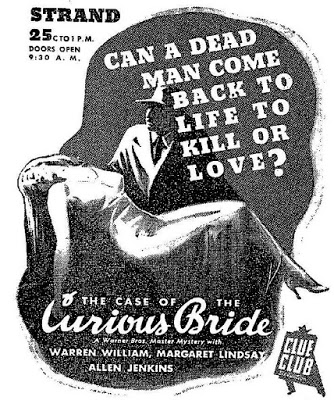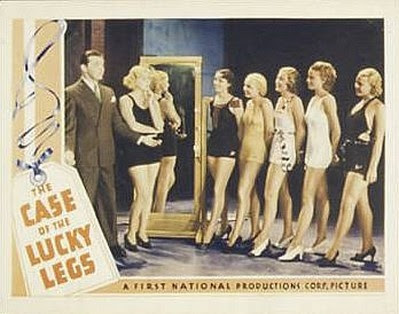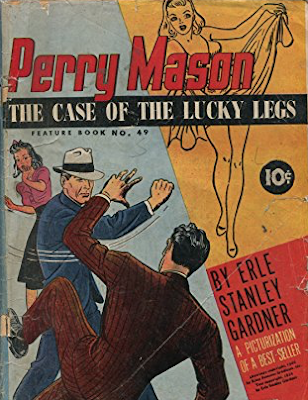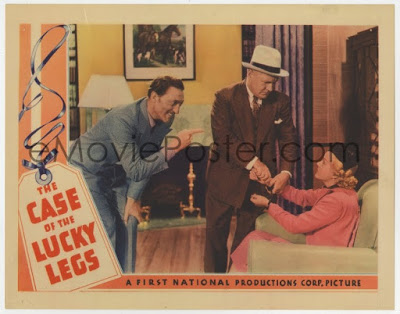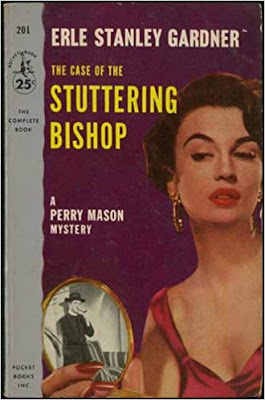Perry Mason Films of the
1930s
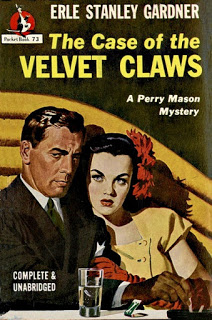
The Case of the Velvet Claw was the first in a series of 82 novels from Erle
Stanley Gardner about his famous lawyer Perry Mason, the loyal secretary
Della Street and his go to guy Paul Drake. Gardner had been a lawyer in California
for over 20 years and knew his legal jargon (though he never graduated from
law school but passed the bar on his own). This was written in 1934 and the
last one (that was published posthumously) was in 1973. Right from the beginning
the novels were popular enough to be made into movies and a series of six
Perry Mason films were made from 1934 to 1937. Four of them starred the stern
angular Warren William who is almost forgotten now but was a star of sorts
back then and was in over 60 films before his death at 53 in 1948. He also
played Philo Vance, another literary detective, in a few films as well as
the Lone Wolf, in another mystery series.
William’s portrayal of Perry Mason is quite different than that of the famous
TV series with Raymond Burr (who had almost always played villains until
the TV show) as is Perry in The Case of the Velvet Claw novel. This literary
Perry isn’t the Perry we all grew up with. He is basically Mike Hammer in
lawyer clothes, willing to get his clients to lie, willing to fake or hide
evidence, willing to pay the cops for information, willing to sock a guy
in the jaw, willing to blackmail witnesses and more than willing to take
money from his client. Money seems to be his goal as much as getting his
client off. Seemingly over the years Perry took a few ethic classes and softens
up till we get to Raymond Burr’s Perry whose clients never seemed to pay.
There was also a Perry Mason radio show that ran from 1943-1955.
The Mason of the early books was no charity as this bit of dialogue indicates:
“Somehow you inspire me with confidence. You’re the only man I ever knew
who could stand up to my husband. I feel as though I could cling to you and
you’d protect me”
She tilted back her face so that her lips were close to his, and her eyes
were staring into his. Her body was quite close to his.
“I’ll protect you just as long as you pay cash”.
At the time of Gardner’s death he was the biggest bestselling American writer
of the 20th century. And Evelyn Waugh who I think is a wonderful writer called
Gardner the best living American writer in 1949.
I have a soft place for Perry Mason because of the TV show which I like a
lot. When I visited my parents I used to watch it in the late afternoons
with my mother after I picked up the DVDs. In the first few seasons in the
opening credits there is this little old lady who was sitting in the back
of the court who looked just like my mom’s mother so we would always wonder
how Nanny ended up on a Hollywood set by accident and whether she even knew
where she was. It made us feel good to think about Nanny and now it makes
me feel good to think about my mother when I watch Perry Mason.
Warner Brother's struck a deal with Gardner to the rights of six of his novels.
The Case of the Howling Dog (1934) - 7.0
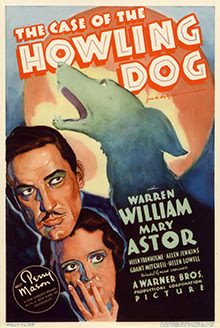
In this first Perry Mason film, he has a large law firm of numerous lawyers
working for him, an army of secretaries and a few private investigators (but
no Paul Drake in this one). He really prefers handing off cases to his underlings
– but one afternoon a man barges in sweating like he is in a sauna wild-eyed
and on the verge of a nervous breakdown. A howling dog is the reason why.
He wants to hire Mason to write up a will and stop the dog. He throws $10,000
on his desk and Mason is suddenly interested – his spending habits are like
a runaway train.
This seems simple enough but gets complicated quickly with wives who are
not wives and husbands who are not husbands. And a secretary who as Mason
astutely observes seems to be dressing down. When a murder occurs one of
the wives seems to be the obvious killer but those pleading eyes and innocent
voice that this actress perfected a few years later in The Maltese Falcon
persuades Mason that she is innocent. She is Mary Astor of course. Who can
say no to Mary Astor.
This is quite decent with a few nice surprises and a good ending – no, not
the one in which Mason leans down for a kiss with Della but just before that.
The narrative moves briskly along like it is being chased by a debt collector
and Warren William is terrific as Mason. I always enjoy his performances
in these Warner Brothers films – either as villain which he played often
or as hero which he did his share of as well – wonderful diction that he
spits out like a machine gun and a personality that cuts through the noise
like a whip. He is somewhere between the book character and the TV character
and strikes a great balance of being slightly deceitful but at his core ethical
The Case of the Curious Bride (1935) - 7.0
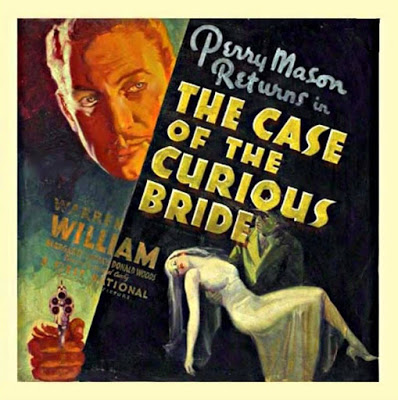
The second film in the Perry Mason series of films in the 1930’s is again
a fast paced convoluted murder story that has enough suspects to fill a small
ballroom. A few changes have been made since the previous film – Della Street
is now being played by Claire Dodd and she and Warren William as Mason have
great whiz bang chemistry, Mason seems to have lost his huge organization
and only has Della and his right hand man, the resourceful Spudsy Drake (getting
closer to Paul Drake) played by Allen Jenkins, who was a cop in the first
film. Spudsy also adds a bit of comic relief to the film. William plays Mason
with such zest, a joy of living with fast strides and a faster patter that
he is a pleasure to watch as he zips around like a pinball.
An old female friend (Margaret Lindsay) comes to Mason with a problem – her
former husband who died four years ago has been seen alive thus making her
marriage to a millionaire’s son illegal. When the former husband really turns
up dead this time, she is the prime suspect as she and apparently much of
San Francisco were at his apartment that night. It keeps you guessing right
until the end and none of it takes place in the courtroom.
There are a few great little scenes that could only have been in a film from
the 1930’s. When his client is about to be arrested Mason turns her over
to the press and the cops have to wait to get her later. Not familiar with
that law! Later he brings her a five course meal in jail served on silver
platters but best is when he needs the help of a man soon to make a visit
to the gallows, he brings him snails and gets his help with his sister. As
he cheerfully digs into the snails he says how happy he is to give his sister
a job before his neck is stretched. In other words, this is not exactly a
seriously lawyerly case. But it is quite fun.
The film may be just as famous now for the dead man. The corpse. We get to
see him for just a minute in a flashback later on and he might seem vaguely
familiar. An unknown actor from Australia who was about to become famous
overnight. The director of this film is Michael Curtiz, one of the truly
great directors in Hollywood history in my opinion. The number of films he
directed that are considered classics is lengthy from Casablanca to Yankee
Doodle Dandy to Mystery of the Wax Museum and so many more. But he was a
studio man – he worked well within that system taking the films offered to
him and making them as good as he could. When he went independent for a short
period his films did not do well and he jumped back to Warners. His lack
of being an auteur, having his own vision has been a subject of criticism
over the years by film aficionados but as far as I am concerned a good movie
is a good movie and I don’t care whose vision it was.
He was slated to direct a seafaring pirate adventure film and was looking
for a leading man. Warren William thought he was going to get the role –
the studio had already released that to the press and he saw it as a huge
opportunity to break out of his dramatic roles into something very different.
He didn’t get the role in the end and for the rest of his life he looked
back on this as a turning point because he soon slid into the movie world
of B films and never came out of it. The film he thought would have changed
that. Instead Curtiz gave the role to the corpse in this film. The actor
you might have recognized was Errol Flynn who had just shown up in Hollywood
and Curtiz thought he was perfect with his accent, physical skills and dashing
looks. The film was Captain Blood and it made Flynn a star and the two of
them would go on to make a series of classic adventure films; The Charge
of the Light Brigade, The Adventures of Robin Hood, Dodge City, Virginia
City, Santa Fe Trail and The Sea Hawk. I like William a lot but it is hard
to argue against Errol Flynn.
In a bit of totally irrelevant trivia, Captain Blood led indirectly to the
Horatio Hornblower series of books. When Captain Blood was released, C.S.
Forester was working with a producer to write a script for a pirate film
for a competing studio. When they saw Blood they threw it out and Forester
took a cargo ship back to England. On the way back he began writing the first
in the series. The producer he was working with was Arthur Hornblow, producer
of such films as Gaslight, Oklahoma, Ruggles of Red Gap and Witness for the
Prosecution and even cooler, he was married to Myra Loy for 6 years. Forester
borrowed his name. And an even more irrelevant tidbit is that his son worked
for my father in the foreign service in Afghanistan and was an incredibly
nice guy.
The Case of the Lucky Legs (1935) - 6.0
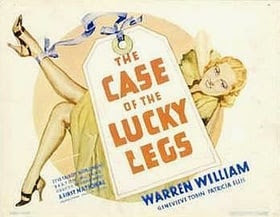
After two solid crime films, for reasons unknown they decide to turn this
third Perry Mason film into a screwball comedy. There is a murder in there
somewhere and a murderer but they seem to be almost an afterthought as Mason
(Warren William) trades jests with Della, delivers bon mots like they are
candy gifts at Christmas and tries to stay on a milk diet after being found
drunk on the floor of his office. He is doing Cary Grant before Cary Grant
was doing Cary Grant. Which isn’t necessarily a bad thing but not what you
expect from a Perry Mason movie. The film never slows down for a serious
moment.
In the 1930’s they had all sorts of contests that entertained people but
also put a few dollars in the pockets of people who needed them. Dance marathons
are the most famous, but there were walkathons as well and various types
of beauty contests. In this film there is a Lucky Legs contest in which the
women (no men allowed) display only their legs as the rest of them are hidden
behind the curtains. The audience votes and the girl (Patricia Ellis) who
wins $1,000 is thrilled until her boyfriend (Lyle Talbot) calls her half-dressed
in her one-piece bathing suit and a heifer. Probably the wrong thing to say.
On top of that it turns out that the sponsor is a scam artist and does a
runner. Not too much later the sponsor turns up dead. Our girl is the main
suspect and Mason is on the case and immediately breaks the law by stealing
evidence at the murder scene and hiding his client from the police.
The actress who plays Della is switched on us again. This time it is the
spunky wisecracking Genevieve Tobin doing her best imitation of Joan Blondell.
In the cast also as the chief of police is Barton MacLane who must have the
all-time record of appearing as a cop in movies. The film is ok if taken
as a fast talking comedy but as a crime film with even an iota of suspense
and mystery, not so much. The director is Archie Mayo who began in the films
directing slapstick shorts for the first eight years of his career - which
might explain the direction this film goes in - but in the same year he directed
Petrified Forest with Bogart, Davis and Leslie Howard which is such a brilliant
film.
The Case of the Velvet Claw (1936) - 5.0
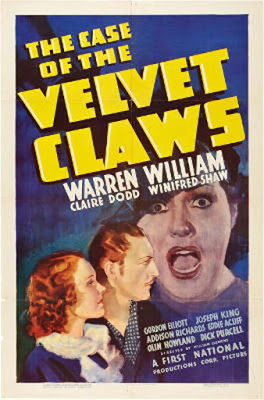
Warren William returns in his fourth and final outing as lawyer Perry Mason
in this film. This is a return to a solid crime story from the previous outing
as it keeps the humor to a minimum. It also though only runs for 65 minutes
while the others were close to 80 minutes - reflecting perhaps its descent
to B film territory. We get a new actor (Eddie Acuff) playing Spudsy, his
right hand man from the previous two films and a return for Claire Dodd as
Della from the second film. She and Warren have a Thin Man repartee between
them. But in an odd choice they have him marrying Della at the beginning
of the film and then trying to consummate that marriage for the rest with
constant coitus interruptus occurring.
The Case of the Velvet Claw is actually Gardner's first book in the very
long series and fairly closely follows the plot with the exception of the
marriage and the goofy sidekick Spudsy. A woman comes to Mason with a gun
interrupting his wedding night and demands that he come with her. The gun
and the $5,000 is a good incentive. Before long Mason is being accused by
her for the murder of her husband but Mason still takes her on for a client.
And $5,000. He keeps trying to get back to his matrimonial bed to a waiting
Della but every time he looks like he is about to pull the trigger there
is a knock on the door. Like all of these Warren William Mason films, it
moves along faster than a speeding bullet and occasionally hits its mark.
By this time William's time at Warner was coming to an end. He was more and
more frustrated with the roles and movies he was getting. From headliner
to co-star to supporting actor and in a slew of mediocre B films. In 1935
he was to opt out of his contract and paying $10,000 for the honor of doing
so. He left Warner's but he was in his 40's now and newer, younger actors
with a different style than his were coming into style. So he never got back
to the A films that he wanted but ended up settling for more B films and
starring in the Lone Wolf series (which I quite like).
The Case of the Black Cat (1936) - 4.0
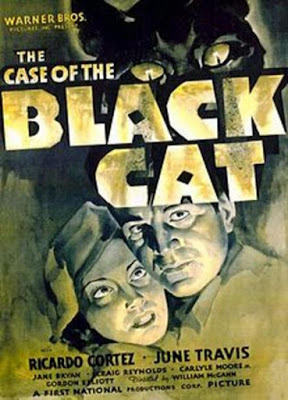
For the fifth Perry Mason film they change everything up. Warren William
is gone and has been replaced by Ricardo Cortez as Mason, Della Street is
now played by June Travis and Spudsy Drake is now called Paul and is played
by Gary Owen. And Perry and Della are not married (as they were in the fourth
film) and never have been - but are still flirting with one another . It
takes a bit to get used to if you watch the films in order. This film is
organized in much the same way as the later TV show was - a story upfront,
a murder, an investigation by Mason and Drake and a denouement in court.
And Burger is the D.A. The denouement is a bit ridiculous as the judge allows
Mason to tell how the crimes really went down - with no interruption from
Burger - and the judge just accepts Mason's story and frees the defendant.
Well they had to squeeze the film into 60 minutes I guess but the viewer
is left with no clue as to how Mason gets there. Lazy scriptwriting. But
a nice surprise ending that I should have seen coming but didn't. This was
the only one of the six films not adapted from a Gardner book.
An elderly wealthy man tells his heirs how he is dividing his fortune in
the will. Never a good idea in a murder mystery. Sure enough he dies in a
suspicious fire. And diamonds are missing and bodies begin to pile up. Mason
is a step or two or three ahead of everyone else. There is a cat in there
but he isn't black - the prop man must have gotten hell. Ricardo Cortez was
the original Sam Spade back in 1931. He was actually Jewish from NYC but
Hollywood molded him into being this suave Latin lover in a number of films
starting in the silent days but I always like him better as a tough George
Raft type. He was popular for a while but he never really took off. He is
ok as Mason but after William in four films he feels sort of Mason light
- to eager to please. Of some interest perhaps to Western fans is that one
of the suspects was Bill Elliot - then going under the name Gordon
Elliot - who within a few years was to go on to B Western fame in a slew
of films. Also appearing in the elderly Peter Laxter role was the 70 year
old Harry Davenport who didn't begin acting in films until he was nearing
fifty and that lasted till 1949 and over 100 films. He and his voice are
instantly recognizable and you have seen him in small parts in loads of films
usually as a judge, doctor or other respectable kindly person.
The Case of the Stuttering Bishop (1936)
- 5.5

Once again the cast for Perry Mason has an overall casting change in the
sixth and final film in the Warner Brothers series. I don’t know why they
couldn’t keep actors in place from film to film. Perry is played by Donald
Woods who I am unfamiliar with though he has an extensive filmography over
40 years; some of which I have seen. That he never registered in my memory
might say something. Della goes to Ann Dvorak with her very distinctive looks
– she was pretty much stuck in B films but during WWII went off to England
to drive an ambulance in the war effort. Drake and Burger are both played
by different actors as well. Best for me is the introduction of a new character
– a hotel dick played by Tom Kennedy who as usual is a bit muddled and dim
but always cracks me up. Part of the reason that the actor playing Mason
was switched in the last two films was because Gardner hated Ricardo Cortez's
as Mason and wasn't thrilled with Woods. So after this last film he lost
interest in having Mason on film until the TV show where he personally selected
Raymond Burr and he appeared in the very last show in the series as a judge.
This was better than I had expected. Another man announces his intention
to make a new will the next day and who is going to get it. A deadly combination
in B films. It is as convoluted as a drunk’s syntax with people not
being who they seem to be and lots of potential suspects as it should be.
Unlike the other films a large chunk of it takes place in the court room
and even Perry doesn’t really see where it is going. Woods does a fine job
as Mason though more boyish than we are used to. Dvorak as Della is perfect.
And after this Mason was not to appear on film until the TV show began in
1957.



